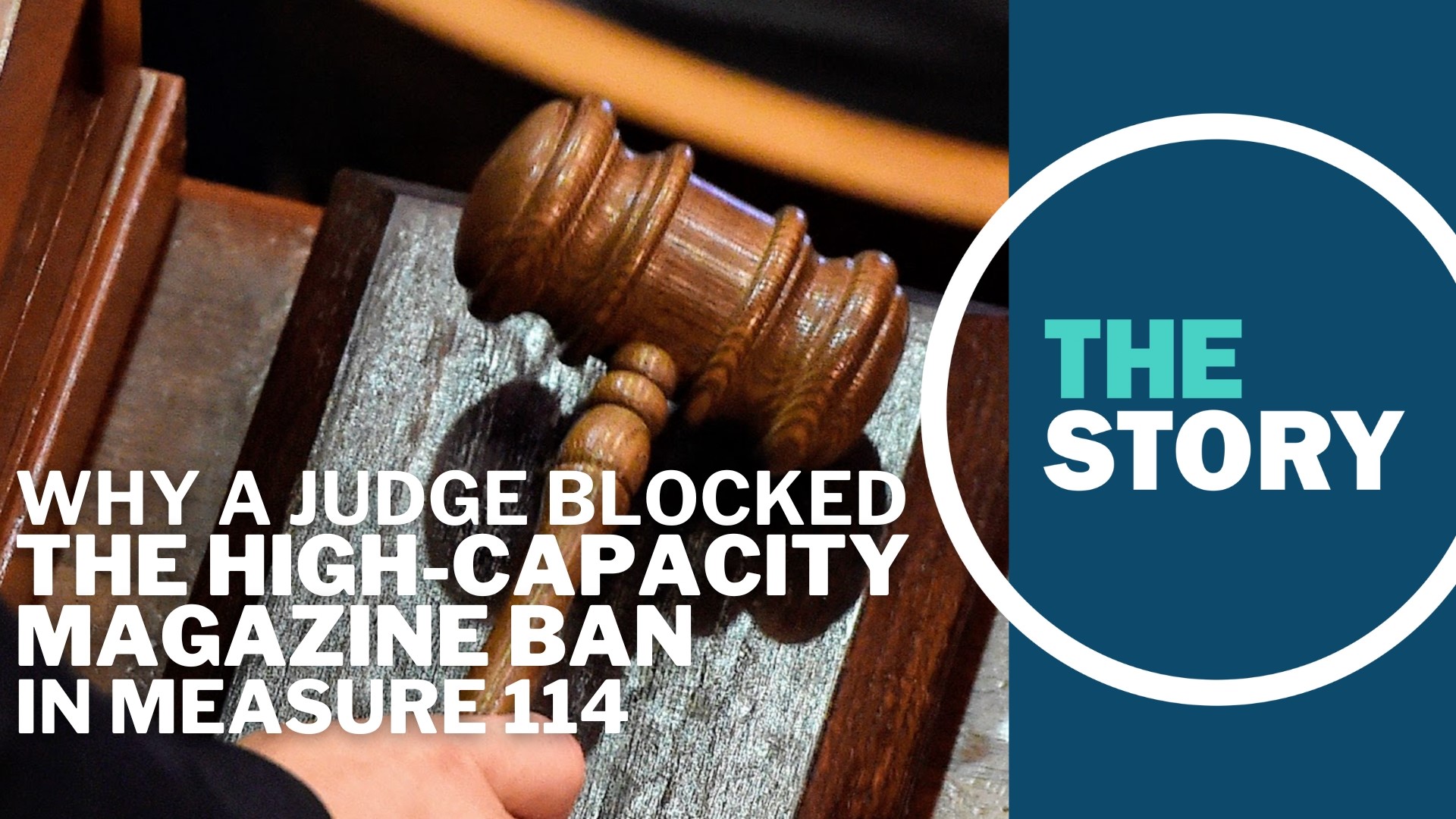PORTLAND, Ore. — A Harney County judge on Thursday issued a preliminary injunction that will block enforcement of the high-capacity magazine ban in Oregon's Measure 114 until a full trial can be held.
The ban on magazines that hold more than 10 rounds of ammunition was one of two key components of the gun control package that Oregon voters narrowly approved last month; the other piece was a new permitting system for gun purchases.
The measure would have taken effect Dec. 8, but the group Gun Owners of America challenged it in court and Judge Robert S. Raschio issued a temporary restraining order on Dec. 6, blocking it from going into effect until a preliminary injunction hearing could be held to assess its constitutionality.
At a hearing Tuesday, Raschio opted to keep the temporary restraining order in place for the permitting process, stating that he would maintain it until the state notifies him that it's prepared to roll out the new permit system, at which point he will schedule a preliminary injunction hearing.
Raschio heard a significant amount of testimony about the high-capacity magazine ban during Tuesday's hearing, but didn't issue a ruling on that portion of the measure until Thursday.
The injunction is preliminary and a final legal determination won't be made until after a trial, but Raschio laid out several concerns about the ban that he said justified the temporary halt, citing testimony from Tuesday's hearing.
One of the people who testified Tuesday was a firearms dealer who argued that because most of the guns in his inventory could be easily modified to hold more than 10 bullets, he would be unable to sell them because there would be no legal magazines to sell with them.
"Based upon the preliminary evidence, the result of BM 114 would be a near absolute prohibition on handguns and many other firearms with their magazines," Raschio wrote in his ruling.
Because this is a state case, not a federal one, it hinges on interpretation of the Oregon Constitution rather than the Second Amendment to the U.S. Constitution. Oregon's founding document has a similar clause, though it differs in wording:
"Right to bear arms; military subordinate to civil power. The people shall have the right to bear arms for the defense of themselves, and the State, but the Military shall be kept in strict subordination to the civil power."
Judge Raschio wrote that, in examining the historical background of the state constitution and existing case law surrounding it, the state was wrong to argue that the 1857 constitution was written at a time before "high-capacity magazines" were in use.
"The Plaintiffs demonstrate that firearms with magazine capacity over 10 rounds of ammunition were in existence at the adoption of the Oregon Constitution in 1857," Raschio wrote. "Article l, section 27 was adopted without any noted debate by the delegates ... The court infers from that silent record that no concerns were raised over the types of firearms allowed for self or state defense."
Oregon's founding occurred just prior to the Civil War, when the majority of firearms were still muzzle-loading, single-shot muskets. More advanced small arms gradually saw wider use over the course of the conflict, primarily in the form of revolvers and lever-action repeating rifles. There were some examples that existed prior to the Civil War, however.
"The analysis of this court is that the framers and the population were aware of, and even anticipating, more powerful firearms including with larger magazine capacities," Raschio continued. "As such, the court finds that the firearms today are the direct decedents of the firearms from the timeframe of statehood: multi-shot handguns and rifles. The type of magazine is essential to the protective power of the firearm as was testified to by one of the defendants' witnesses."
The judge also rejected the state's claim that a ban on high-capacity magazines would help reduce mass shootings, and would help relieve a "grave and immediate risk to the health, safety and well-being of the citizens of this state."
"That the large capacity magazine bans promote public safety is mere speculation," Raschio wrote. "(The ban) does not restrain dangerous practices or regulate the carrying or use of firearms, only the possession of a ubiquitous weapon design."
The cited study looked at 604 mass shootings. It concluded that bans on high-capacity magazines "seem" to reduce the frequency of mass shootings.
Raschio acknowledged that the data presented by the state suggests high-capacity magazine bans can have an effect on the deadly outcomes of mass shootings, but said that the sample size was too small to definitively conclude as much.
The judge weighed that data against the idea that a ban like this would be "unduly burdensome" on Oregonians, about 20% of whom own a gun. An estimated 5% of Oregonians own high-capacity magazines, and Raschio said that they would be presumed guilty of a class A misdemeanor unless they could prove that they owned them lawfully prior to the law taking effect.
Measure 114 includes a "severability clause," which means that if a court finds that one part of the measure is unconstitutional, it would not strike down the thing in its entirety. Each part will need to be examined separately, which means that the high-capacity magazine ban and firearms permit requirement will be weighed separately, and could have separate fates.
Law experts think that the case will ultimately go to the Oregon Supreme Court, and it could take months, even years to decide.
The next update on Measure 114 is expected to come next Friday, Dec. 23. Judge Raschio is scheduled to hear arguments about another aspect of the measure, the so-called "Charleston loophole."
For gun buyers who find themselves waiting longer than three days for a background check to be completed, the gun dealer can legally hand over the gun. That's the loophole — one that Measure 114 would close. A ruling is expected on this part during the first week of 2023.

